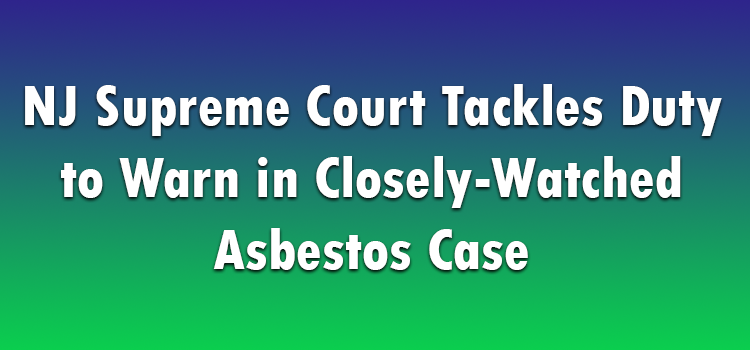The New Jersey Supreme Court recently heard oral arguments in Whelan v. Armstrong International, which is predicted to have a significant impact on product liability law. The case involves whether a manufacturer has a duty to warn about the risk of harm from exposure to asbestos-containing replacement parts, even if the manufacturer did not fabricate or distribute those parts.

Facts of Whelan v. Armstrong International
Plaintiff Arthur Whelan contends that he developed mesothelioma as the result of his work-related exposure to numerous asbestos-containing products. He asserts, as a plumber and auto mechanic, he was exposed to asbestos in products manufactured by the defendants, specifically boilers, valves, steam traps, and brake drums. Although Whelan installed and worked with some original products manufactured by some defendants, he primarily encountered asbestos in his cleaning, repair, and replacement of components used in the products.
Defendants Armstrong International Inc., Burnham LLC, Carrier Corp., Cleaver-Brooks Inc., Crown Boiler Co., Ford Motor Co., Johnson Controls Inc., NIBCO Inc., and Oakfabco Inc. filed summary judgment motions. Each defendant argued that Whelan had not demonstrated exposure to friable asbestos on a regular and frequent basis from a product it sold, manufactured, supplied, or distributed. The trial judge found that the companies were not liable for asbestos-containing replacement parts they did not manufacture or place into the stream of commerce. Because Whelan could not identify an exposure to asbestos from a product actually manufactured or distributed by defendants, the court granted summary judgment to each defendant.
Appellate Division’s Decision in Whelan v. Armstrong International
The Appellate Division reversed. “We conclude that a duty to warn exists when the manufacturer’s product contains asbestos components, which are integral to the function of the product, and the manufacturer is aware that routine periodic maintenance of its product will require the replacement of those components with other asbestos-containing parts,” the court held.
As explained by the court, a manufacturer will have a duty to warn in strict liability if a plaintiff can show: 1) the manufacturer’s product as marketed to the end user contained asbestos-containing components; 2) the asbestos-containing components were integral to the function of the product; and 3) the manufacturer was reasonably aware its product would require periodic and routine maintenance involving the replacement of the asbestos-containing component parts with other asbestos-containing component parts.
In reaching its decision, the Appellate Division stated that it was “satisfied the imposition of such a duty does not offend basic principles of fairness and public policy that must be accorded to all parties.” It also noted that while there is no clear majority rule among other appellate state courts as to a manufacturer’s duty to warn for exposure to asbestos-containing replacement component parts required for the function of its product, the “recent trend, however, appears skewed towards the imposition of liability on manufacturers even where the worker’s exposure was to replacement parts, where the original product was manufactured with asbestos-containing parts.”
Issues Before Supreme Court in Whelan v. Armstrong International
The New Jersey Supreme Court agreed to consider the following question: “In a products liability case arising out of exposure to asbestos, does a manufacturer have a duty to warn about the risk of harm from exposure to asbestos-containing replacement parts integral to the function of the manufacturer’s product, where the manufacturer did not fabricate or distribute the replacement parts?”
The court heard oral arguments on November 19, 2019. In urging the justices to overturn the Appellate Division decision, the companies argued that its decision “contravenes decades of precedent.”
“The Appellate Division allowing plaintiffs to prove medical causation by exposure to third-party asbestos contravenes decades of precedent requiring exposure to asbestos the defendant actually made or sold, not asbestos that happened to be installed in or used with its products,” the companies’ attorney argued to the court.
Meanwhile, Whelan’s attorney argued that the Appellate Division’s decision was correct. “The policy reasons for imposing duty to warn here are significant,” he argued. “Defendants are in the best position as masters of their equipment to put [out] a warning.”
